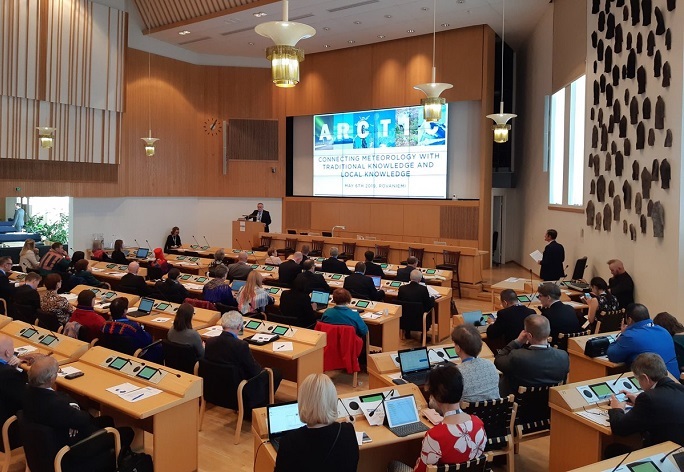Arctic Council seminar in Rovaniemi
Better weather services for indigenous peoples focused
Published : 07 May 2019, 01:22
Updated : 07 May 2019, 01:25
The needs of indigenous communities living in the Arctic area and the services offered by national meteorological organizations were discussed at an Arctic Council seminar here on Monday.
Besides hearing and giving examples of the latest weather changes around the Arctic area, the meeting focused on the needs of the inhabitants of northern areas as customers of weather services.
To assist them in coping with the climate, inhabitants would need more clearly "impact oriented" forecasts, telling what the practical repercussions would be for livelihoods.
BETTER WEATHER SERVICES NEEDED
Opening the event, Petteri Taalas, Secretary General of the World Meteorological Organization (WMO), said there are now indications that the Arctic area is warming at a higher speed than thought. So far the view has been that the Arctic area is warming twice as fast as the rest of the globe, but now some say it would be warming four times faster.
Several speakers from the indigenous groups underlined that better weather services would be needed.
Sergei Anatolievich Sizonenko, vice chairman of Russia's RAIPON Business Council, said the local producers need more information as winters are getting shorter and fish migrates earlier. But he also said that locals themselves may actually be the first to notice a change, and scientists only discover it later.
Louis Uccellini, Assistant Administrator for Weather Services at the U.S. National Oceanic and Atmospheric Administration, concluded that weather related risk assessments by local people in the Arctic areas have changed.
"The traditional weather forecasts do not work." He said the indigenous people have been impacted profoundly, and a dialogue for mutual benefit will be needed, learning from each other.
Aleksander Klepikov, Deputy Director of the Russian Arctic and Antarctic Research Institute, said the event demonstrated that more has to be done to help local people adapt.
Eeva-Liisa Rasmus-Moilanen, Director of the Sami Education Center, told the gathering that this spring the Teno river, in northern Lapland, had lost its ice cover a month before the usual time. She also said that changes have been noticed in the behaviour of reindeer.
FINLAND'S CROWNSOURCING INFO SYSTEM
The Finnish Meteorological Institute (FMI) introduced at the meeting a crowdsourcing-based mobile application for transmitting weather information. The system could be used anywhere where there is access to a mobile phone network. Users can report whether there is precipitation, what the temperature or wind is like, for example.
Juhana Hyrkkänen, head of the Observation Services at the FMI, told Xinhua that people can send the weather info anonymously. The system forms a random based device ID only. "This is a tool for the mass audience and does not replace weather observation stations."
The Finnish service cannot verify if what is sent in is true and correct. "But the crowdsourcing system will ensure that false information would be eliminated," Hyrkkänen said.
Hyrkkänen said the Finnish application is not totally unique. Meteo France has introduced earlier a service which is fairly similar. He also noted that Norwegians have been active in using the services of weather hobbyists.


